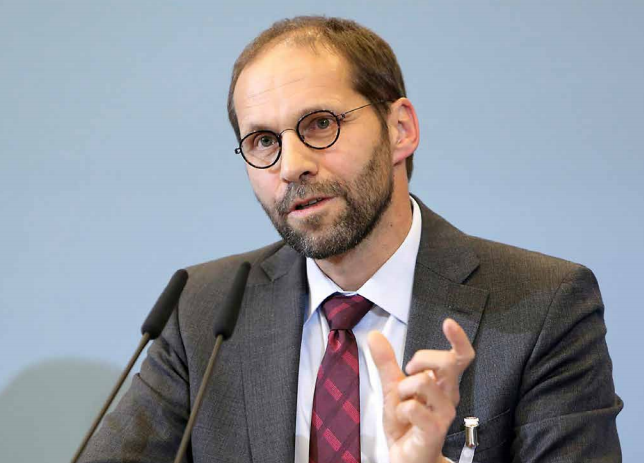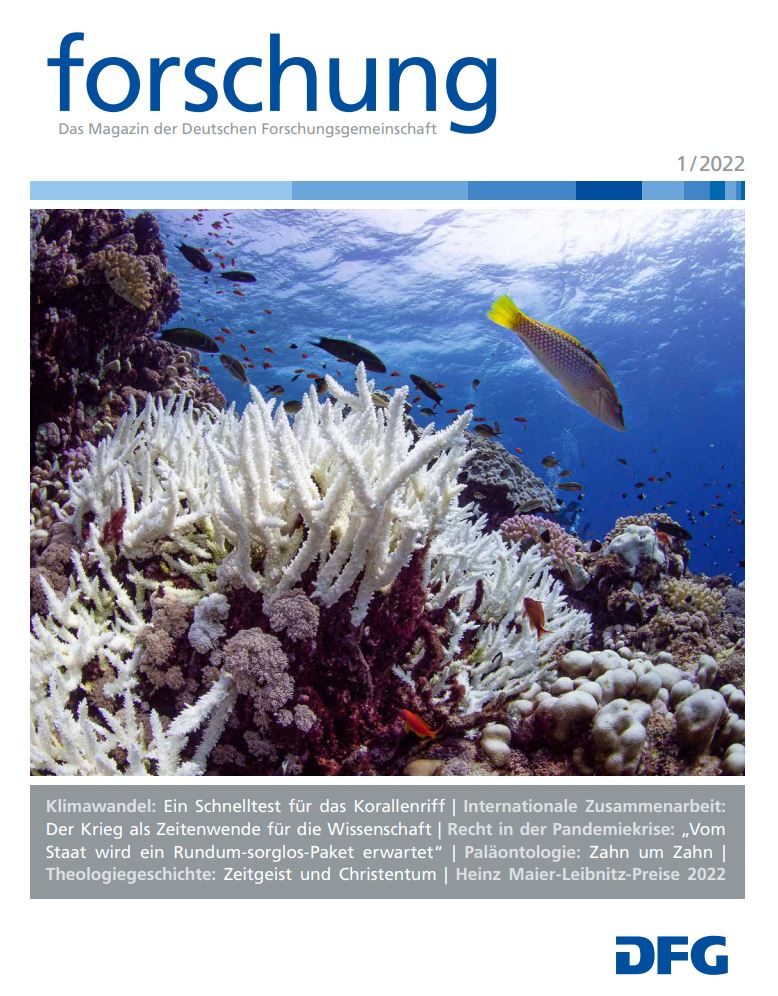„The State is Expected to Provide an All-round Carefree Package“

Prof. Dr. jur. Uwe Volkmann
© BMI
Law in the pandemic crisis: the dilemma of the Infection Protection Act, a constitutional reading of vaccine mandates and the government’s management of civil liberties on the way to a “preventive state”. In conversation with Frankfurt constitutional lawyer Uwe Volkmann, a member of the DFG’s Pandemic Commission.
Interview: Dr. Rembert Unterstell, german research.
german research: Professor Volkmann, we are conducting this interview in mid-March. The current pandemic restrictions are to be eased extensively or eliminated altogether in the near future. Yet infection rates are high and we can see that neither the pandemic nor pandemic control are over yet. Is it possible to resolve this underlying dilemma that faces the new Infection Protection Act?
Uwe Volkmann: The underlying dilemma will always be there, and there are two points of view to consider. Firstly, the significance of infection rates has changed – they mean something different today than they did a year or two ago. Secondly, vaccination is a reasonable option for everyone to at least protect themselves from becoming severely ill. There are other ways to protect oneself effectively, too, such as by wearing an FFP2 mask. This shifts the weight of responsibility between what the state takes on and what is shifted back onto the individual. The option to get vaccinated has been a constitutional tipping point here, too.
The new Infection Protection Act focuses on “basic measures” and a “hotspot strategy”. If the central legal and explanatory justification for the pandemic response – averting overburdening of clinics and the healthcare system – no longer applies, do the restrictions have to be eased?
Essentially I would say yes. However, one prerequisite here is that there is an understanding of what the purpose of the measures is. Ultimately, this has never been clarified at the political level, and it has always remained unresolved in the Infection Protection Act: is the aim to prevent every single infection or just ensure the healthcare system is not overburdened? Both objectives are assigned equal priority in the Infection Protection Act, but the balance between the two remains in limbo. The political protagonists are essentially free to set the objective. But if the aim is to continue to prevent the overburdening of the healthcare system, then this necessarily means that if the relevant risk no longer applies, the measures must be eased or suspended.
Beyond the ubiquitous overload narrative, the justification provided for the restrictive measures is that of protecting life and health. Does this apply equally when a pandemic emergency becomes an endemic situation?
First and foremost, we have to look at how the protection of life and health in the constitution relates to other constitutional assets. Life and health are very valuable legal assets, but they cannot claim absolute priority over other legal interests: the means used to protect them must be weighed up against the impairment of these other legal interests. The only constitutional principle that can claim primacy over all others is the protection of human dignity – this is the highest value underlying the constitution.
Since the start of the pandemic, policy-makers have embraced the principle of proportionality. Many people still recall Merkel’s words that all protective measures must be “effective, necessary and appropriate”. But has proportionality actually shown itself to be a regulating force?
Here again, the answer seems to me to have two sides: the constitutional argument is certainly stronger in Ger-many than in other countries. This is probably one of the reasons why we’ve never had excessive measures here in Germany – I’m thinking of the curfews in France where people were limited to an area of 900 metres around their own home. On the other hand, it has been shown that proportionality is difficult to implement in a situation where there is a large-scale and complex threat like a pandemic.
How do you rate the much-debated general vaccine mandate which is now to be launched in the Bundestag after the so-called “institutionally based” vaccine mandate?
I consider a general vaccine mandate to be constitutionally justifiable based on the key question of how serious you consider the encroachment on physical integrity that such a vaccination involves. Objectively speaking, I don’t believe it’s too serious. At the same time, however, the goal of this vaccine mandate must be determined: what does it actually aim to achieve? If the goal is societal resilience that enables a return to normal life for everyone, there are good constitutional arguments for compulsory vaccination. But then there is an important logical step to take: compulsory vaccination, yes – but then the other measures have to be suspended.
The pandemic regime of recent months has involved special rights for the vaccinated and those who have recovered from the illness, including admission to certain activities and places where evidence of vaccination, tests etc. is re-quired. Do you consider these special rights to be constitutional?
The principle of equality before the law applies: equal things are to be treated equally, but unequal things are to be treated unequally, too. If vaccinated and recovered individuals pose less of a risk in terms of overburdening the healthcare system and also of transmitting infections, then it is not only constitutionally permissible, it is indeed imperative to put vaccinated people in a better position than unvaccinated people.
Where does collective responsibility end in the pandemic and where does individual responsibility begin?
Let me cite an old phrase of political liberalism: insofar as the state’s mandate to protect health can only be fulfilled through a system of restrictions on liberty, this mandate to protect ends where it is reasonably possible for each individual to protect themselves. The problem is that in the course of the pandemic, the weighting between these two elements – collective responsibility and individual responsibility – has shifted. Increasingly, the state has been expected to provide an all-round carefree package.
In retrospect, would there have been alternatives to the state’s pandemic policy?
Constitutionally speaking, there is a whole range of possible responses. The democratically decided pandemic policy pursued is one op-tion under constitutional law, but it would also have been possible from the point of view of a principled protection of life and health to opt for a more liberal path, as Swe-den has done for some time. One of the problems of fighting pandemics is that we have become accustomed to the constant management of individual freedoms by the state.
The state has restricted civil liberties with both a curative and preventive intent. When can a “preventive state” pose a threat to the rule of law?
Since the 1980s and 1990s, the state has been seen to think and act more preventively. But there is one problem with the preventive state: the number of theoretical sources of danger is always greater than the number of actual dangers. Risks can lurk everywhere – anything is possible at all times. Based on this logic of what might possibly happen, far-reaching state interventions can always be justified.
Talking of what might possibly happen: is the impression deceptive that the modes and procedures of political crisis management have fundamentally changed?
Here you’re referring to a fundamental problem of pandemic response. For the most part, the modes and procedures used have largely by-passed what is laid down in the constitution; after all, the constitution does not provide for a forum such as the Conference of State Premiers with the participation of the Chancellery – a constellation where for a long time all the major decisions were made. By the same token, the options offered by parliamentary procedure have been systematically passed over – and this is still true today. This is also why any consent regarding the intrinsic justification of the measures has failed to materialise.
In view of this deficit: which unresolved fundamental question of a constitutional nature would you see as most important today?
When one talks about the consti-tution, there is often a categorical juxtaposition of “constitutional” versus “unconstitutional”. In fact, the constitutional argument is more complex than this: it is ultimately anchored in the contexts and circumstances of our lives. Constitutional assets always have some part to play in the dispute regarding political measures. In the constitution, we negotiate the self-image of our society – the principles that are to determine the way we live together. This self-image is susceptible to shifts that are reflected in changing interpretations of the constitution.
What does that mean in the context of the pandemic?
In this case, the fundamental shift concerns the relationship between individual responsibility and collective responsibility. In my view, people are too quick to call for the state and for the relevant restrictions to be imposed rather than involving civil society more and relying on individual responsibility.
What follows from this?
The result is that after two years of the pandemic, people are no longer asking themselves “What should I do?” but only “What am I allowed to do?” or, conversely, “What are they prohibiting again now?”. You might say there has been a systematic de-valuation of personal responsibility: this is the basic constitutional prob-lem that we should perhaps reflect on here.
Thank you very much for the interview!
Further Information

The interview was published in the
English version of the interview is available in the